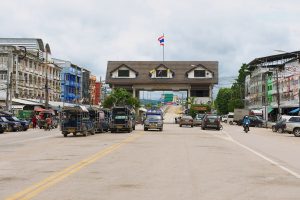Thailand expects to open up a humanitarian corridor in about a month to deliver aid to civilians displaced by the conflict in neighboring Myanmar, the country’s Foreign Minister Parnpree Bahiddha-Nukara said yesterday.
Speaking with reporters after inspecting the planned staging area in the busy border town of Mae Sot, a longtime center of refugee aid operations in Thailand’s west, Parnpree said that the establishment of the corridor “is a crucial step towards alleviating the suffering of those affected by the conflict.”
He added, “We hope that this initiative will not only provide much-needed relief but also serve as a catalyst for dialogue and a peaceful resolution to the crisis.”
The Thai proposal for a humanitarian corridor was endorsed by Association of Southeast Asian Nations (ASEAN) foreign ministers and a representative from Myanmar’s military junta at the close of their informal meeting in Luang Prabang, Laos last month.
Under the arrangement, the exact details of which have not yet been made public, the Thai and Myanmar Red Cross will deliver supplies to populations in need under the observation of the ASEAN Coordinating Center for Humanitarian Assistance on Disaster Management. Parnpree’s deputy said earlier this week that the corridor will be used to deliver food and medical supplies to local communities and around 20,000 people displaced by the fighting inside Myanmar, which has inflamed since the military’s seizure of power three years ago.
This, of course, is only a tiny portion – less than one-hundredth – of the 2.6 million people that the United Nations Office for the Coordination of Humanitarian Affairs estimates are now displaced across the country. (Around 2.3 million of these have been displaced since the coup.)
Access will be further restricted by the necessary involvement of Myanmar’s military administration. In the three years since the coup, aid organizations and ethnic resistance groups have called frequently for the establishment of humanitarian corridors across the Thai-Myanmar border, to direct aid to the resistance groups that control much of the territory in the border areas.
Parnpree confirmed yesterday, however, that the corridor was being established with the consent and cooperation of the junta. As The Associated Press reported, this means that “activities on the Myanmar side of the border will be handled by that country’s ruling military council.”
Nay Phone Latt, a spokesperson for Myanmar’s opposition National Unity Government, which is coordinating the resistance to military rule, yesterday urging that the aid instead be directly to the ethnic resistance groups, saying that the Myanmar military could easily employ the aid for its own purposes.
The consent of the military junta was probably a sine qua non for the Thai government’s to propose such a plan, and for the remaining ASEAN members to approve it. But this will foreclose any possibility that the humanitarian aid will reach any displaced populations in areas under the control of resistance groups, which the junta views and treats as “terrorists.”
In this sense, Tte Thai plan merely recapitulates the flaws of ASEAN’s Five-Point Consensus peace plan, which treats the military administration as a legitimate partner of peace, when its actions point very much in the opposite direction. Indeed, the military will likely continue its attacks on resistance groups and civilian populations believed to harbor them, including by air, resulting in further civilian casualties and new rounds of displacement. It may also result in aid shipments being redirected to the military and its allies.
In an article today for the Bangkok Post, former Thai Foreign Minister Kasit Piromya, now a board member of the advocacy group ASEAN Parliamentarians for Human Rights, said that without the military ceasing its attacks, any aid sent down the new humanitarian corridor will “merely be a band-aid on a gunshot wound.”
He added, “How can this initiative be taken seriously without incorporating local groups who have the experience of providing to those in need across the border or including the border ethnic minorities themselves who require such assistance?”

































